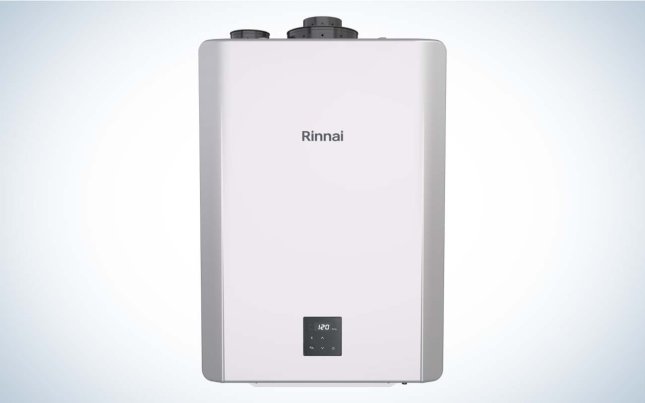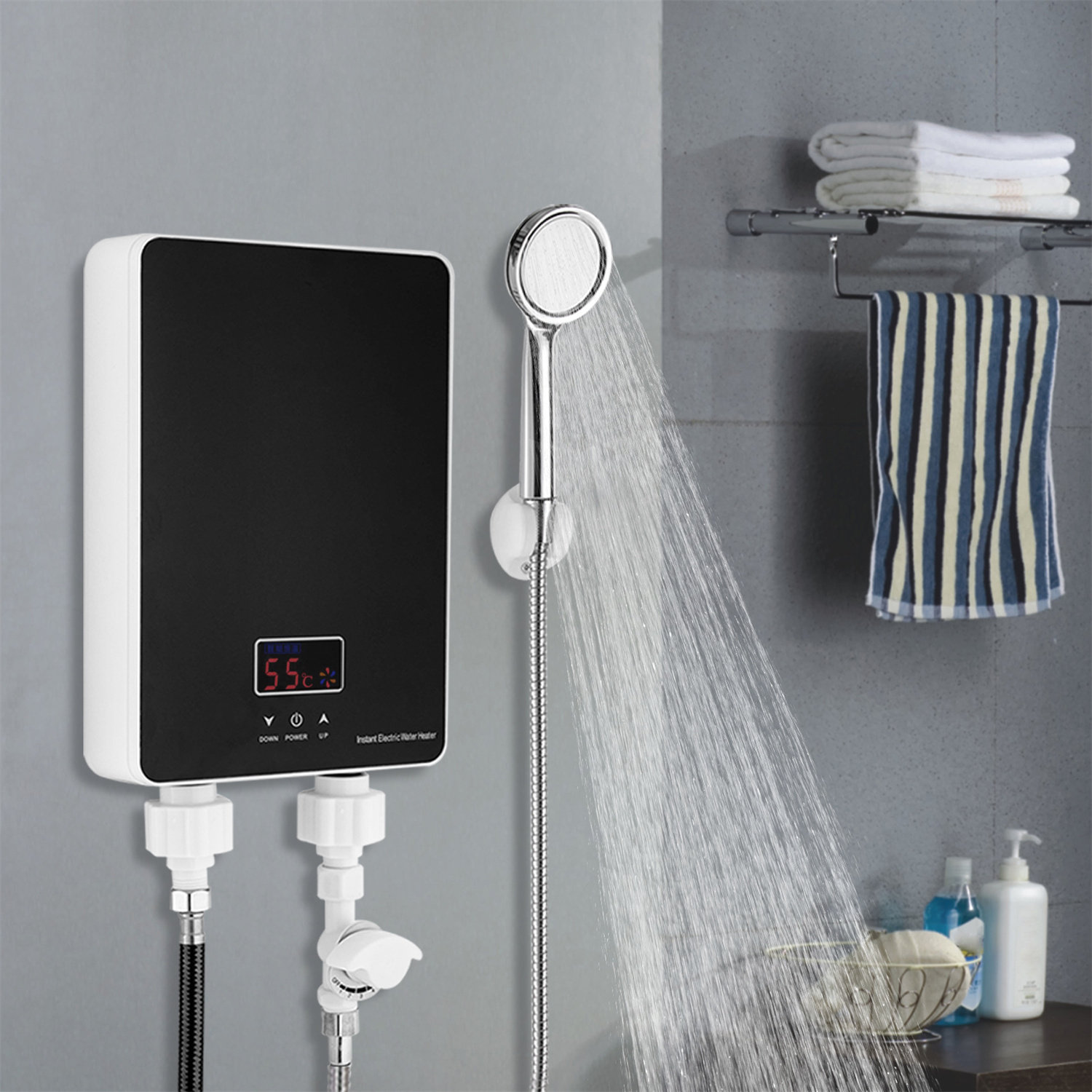We've uncovered this great article relating to Unveiling the Hot Trend: The Benefits of Tankless Water below on the net and thought it made sense to relate it with you on this site.

In a world where comfort and effectiveness preponderate, it's not a surprise that home owners are frequently looking for smarter means to manage their home's energy consumption and comfort. One advancement that has actually progressively acquired popularity is the tankless hot water heater. Yet what exactly makes these systems stick out from the conventional tank-based models most of us matured with? Allow's dive in and explore the benefits of tankless water heaters, assisting you make a decision if it's time to make the switch in your home.
Introduction
Picture this: you step into the shower after a long day, anticipating a comforting waterfall of warm water, just to be greeted by icy beads due to the fact that the last individual used it all up. Sound acquainted? Traditional hot water heater store a fixed amount of warm water, indicating you're at the grace of that storage tank's supply. Tankless systems, on the other hand, warmth water on demand. No more going out mid-shower, say goodbye to fumbling with routines simply to make certain warm water is available.
Recognizing Tankless Water Heaters
What Are Tankless Water Heaters?
Tankless hot water heater, sometimes referred to as on-demand or immediate hot water heater, offer warm water just as it's needed. As opposed to storing gallons of pre-heated water, these systems kick into action the minute you switch on the faucet. Water travels through a warm exchanger, heating up in real-time, indicating you obtain a continuous circulation of hot water without the need for a huge tank resting idly by.
Exactly how Do They Differ from Conventional Systems?
Standard heaters hold a reservoir of hot water, using power to maintain that container at a constant temperature. Tankless units eliminate the standing supply, minimizing thrown away power and the large footprint of a huge cylinder. Essentially, you're upgrading from a "accumulation" frame of mind to a "made-to-order" approach.
Typical Kinds Of Tankless Devices
Tankless water heaters usually can be found in 2 selections: gas and electrical. Gas designs tend to supply higher circulation prices, ideal for larger homes, while electric designs frequently offer smaller sized homes and are commonly simpler to mount. Furthermore, some systems are made for point-of-use (serving one component) while others can take care of the entire home's warm water needs.
Key Advantages of Tankless Hot Water Heater
Energy Efficiency and Cost Savings
Say goodbye to warming a giant storage tank's well worth of water and keeping it warm throughout the day. Tankless heating systems reduce standby energy losses, which can reduce utility costs. While the preliminary cost could be higher, the long-term savings frequently warrant the financial investment.
3. Space-Saving Layout
If your home is short on storage space, removing the large tank liberates important room. Tankless devices are compact and can typically be mounted on walls, stashed in corners, or installed in limited utility storage rooms without having all to oneself the whole room.
4. Longer Lifespan
A well-kept tankless water heater can outlive its tank-based cousin. Standard storage tanks may last 10-15 years, while tankless versions can keep downing along for 20 years or more, making them a strong investment gradually.
1. Limitless Warm Water Supply
Ever before needed to arrange showers so everyone gets their reasonable share of hot water? With tankless, that comes to be a distant memory. As long as the heating system's flow capability isn't surpassed, you can take back-to-back showers without developing into a popsicle.
5. Improved Water Top Quality
Keeping water in a storage tank can often cause debris accumulation or a slightly "off" preference. With tankless systems, fresh water is heated right away, lowering the chances of sediment buildup and possibly providing cleaner-tasting water.
Considerations Prior To Changing
Though the benefits are engaging, it's smart to consider a few factors prior to totally devoting.
Assessing Your Home's Water Use Patterns
If your family at the same time makes use of several fixtures with high warm water demand, ensure the device's flow price meets your requirements. Recognizing your usage patterns helps you pick the right size and sort of tankless heating unit.
Upkeep and Care Tips
Tankless systems are fairly low maintenance, yet they aren't set-it-and-forget-it appliances.
Normal Cleansing and Descaling
Hard water minerals can accumulate in the warm exchanger, impacting efficiency. Regular descaling (usually advised annually) keeps the system performing at peak performance.
Yearly Professional Inspections
A yearly checkup from a specialist ensures small problems are caught early. They'll analyze the device's performance, search for leakages, and help keep optimal efficiency.
First Financial Investment Costs
Tankless heaters normally include a greater upfront cost. In between the device itself and prospective installation adjustments, the initial cost might provide you sticker label shock. However remember to view it as a long-lasting investment.
Installment Requirements
Depending upon your home's framework, you might require added electrical capacity or gas line upgrades. Ensure you comprehend the installment requirements and speak with a professional to avoid surprises.
Making Sure Appropriate Ventilation
For gas versions, appropriate air flow is necessary to safely get rid of exhaust gases. Make sure airing vent systems are clean and appropriately set up to stop any type of potential safety and security threats.
Comparing Different Brands and Models
Not all tankless water heaters are developed equivalent.
Investigating Dependable Producers
Try to find trustworthy brands with a background of generating quality devices. A reliable maker often gives much better client support and longer warranties.
Installment: Do It Yourself or Specialist?
While some property owners delight in tackling projects themselves, tankless installment may not be the very best time to break out the tool kit.
Benefits and drawbacks of DIY Installment
A do it yourself mount can save cash, yet it includes risks. Wrong setup can bring about ineffectiveness or safety concerns. If you come in handy and have experience, it could be practical-- but proceed with caution.
Checking Out Testimonials and User Feedback
Individual testimonials and responses from neighbors or pals who have gone tankless can supply useful insights. Sometimes, real-life experiences can be a lot more informing than advertising pamphlets.
When to Call a Specialist Plumbing Professional
For most, calling a professional ensures every little thing's done appropriately. An expert plumber comprehends neighborhood codes, sizing requirements, and airing vent specifications, lowering the risk of incidents.
Taking full advantage of Efficiency
You have actually purchased a tankless unit-- now maximize its performance.
Ideal Temperature Setups
Most people set their systems between 120-140 F. Readjusting the temperature level can enhance comfort and cost savings. Experiment to find a pleasant place that does not waste energy.
Pairing with Low-Flow Fixtures
Wish to extend your device's abilities? Think about setting up low-flow showerheads and faucets. They reduce water use, permitting your tankless system to provide a stable stream of warm water without stressing.
Ecological Influence
Tankless hot water heater line up with greener living goals.
Decreased Carbon Footprint
By using much less power and only home heating water as needed, tankless systems can reduce your home's carbon impact, minimizing your environmental influence.
Conserving Natural Resources
Much less energy consumption and much less wasted hot water convert into fewer natural deposits being used, an ecological win-win.
That Profits Most from Tankless Heating units?
The elegance of tankless heaters is that they can fit a selection of households.
Large Households vs. Solitary Passengers
Large family members may enjoy the countless hot water supply, while solitary passengers value the energy financial savings from not heating up an entire tank for simply someone's morning shower.
Home Owners with Restricted Room
If your home is short on square video footage, losing the large tank liberates area for other fundamentals-- or maybe just extra elbow room.
Eco-Conscious Customers
Going tankless aligns with environmentally friendly worths, ensuring you're not wasting power or sources.
Future Patterns in Tankless Hot Water Heater
The globe of home appliances is ever-evolving, and tankless water heaters are no exemption.
Advancements in Innovation
R&D is frequently improving heat exchangers, making devices extra reliable and durable. Future models might be even quieter, more small, and much better suited for varying environments.
Smart Home Assimilation
Visualize changing your hot water heater's temperature level via an application or getting upkeep alerts on your phone. As smart home technology advances, we'll see more connection and ease.
Conclusion
Selecting a tankless water heater is greater than simply upgrading your home's hot water system; it's buying lasting comfort, power effectiveness, and a greener way of living. By considering your family's water usage, bearing in mind installment demands, and devoting to regular maintenance, you can take pleasure in a steady stream of hot water without the baggage of a cumbersome storage tank. As modern technology advances, you can look forward to even smarter, a lot more reliable tankless remedies that not just make your life less complicated but likewise benefit the world.
Why You Should Consider a Tankless Water Heater for Your Home
Energy Efficiency and Cost Savings
Tankless water heaters, also known as on-demand water heaters, heat water only when needed. This means they don't waste energy keeping a tank of water hot constantly. This efficiency translates into substantial cost savings on your monthly energy bills.
Endless Hot Water Supply
One of the significant advantages of tankless water heaters is their ability to provide a continuous supply of hot water. Traditional tank water heaters have a limited capacity and can run out of hot water, especially during peak usage times. In contrast, tankless water heaters can provide an endless stream of hot water, making them ideal for larger families or homes with high water usage.
Space-Saving Design
Tankless water heaters are compact and take up significantly less space compared to traditional tank heaters. They can be installed on walls, under cabinets, or even outside, freeing up valuable space in your home. This makes tankless water heaters a great option for smaller homes or properties with limited space for a traditional water heater.
Longer Lifespan and Lower Maintenance
Tankless water heaters typically have a longer lifespan compared to traditional tank heaters. They can last up to 20 years or more with proper maintenance. Additionally, tankless systems are designed with replaceable parts, which can extend their lifespan further and reduce long-term maintenance costs.
Environmentally Friendly
Reducing energy consumption not only saves you money but also benefits the environment. Tankless water heaters contribute to a smaller carbon footprint by using less energy to heat water. Their energy efficiency and ability to minimize standby heat loss make them an eco-friendly choice for environmentally conscious homeowners.
Customized Temperature Control
Tankless water heaters offer precise temperature control, allowing you to set the desired temperature to meet your specific needs. This level of customization ensures you always have water at the perfect temperature for your comfort and usage requirements.
https://beantownservices.com/blog/consider-tankless-water-heater-for-your-home

I'm certainly very fascinated by and I really hope you enjoyed my page. I beg you take a moment to share this blog entry if you liked it. We thank you for reading our article about Unveiling the Hot Trend: The Benefits of Tankless Water.
Request An Appointment